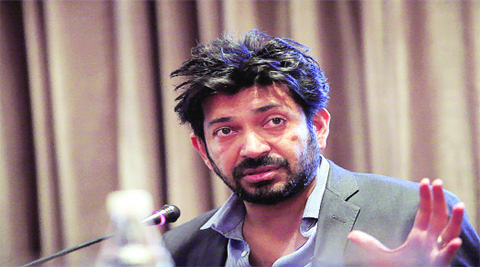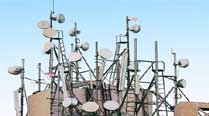No link between mobile phone radiation and cancer, says Padma awardee doctor
Express News Service | New Delhi | April 22, 2014 1:11 am
 Pulitzer award winning India-born oncologist Dr Siddhartha Mukherjee addresses a press conference in the capital on Monday. (Tashi Tobgyal )
Pulitzer award winning India-born oncologist Dr Siddhartha Mukherjee addresses a press conference in the capital on Monday. (Tashi Tobgyal )SUMMARY
Calls for revision of World Health Organization’s list of carcinogens, says not enough data to establish the link.
RELATED
India-born oncologist Dr Siddhartha Mukherjee on Monday urged World Health Organization to remove cellphone radiation from the list of carcinogens on the ground that the “preponderance of evidence suggests there is no link” between radiation from mobile phones and cancer. In an event sponsored by COAI (formerly known as Cellphone Operators Association of India), India International Centre and Open Health Systems Laboratory, he delivered a lecture making a strong case for the revision.
Dr Mukherjee, author of the Pulitzer winning book The Emperor of All Maladies: A Biography of Cancer that was published in 2010, is currently in India to accept the Padmashree award. He is an assistant professor of medicine at Columbia University and a staff physician at Columbia University Medical Center in New York City.
In a recent article in The New York Times he had argued that the drastic increase in cellphone usage does not mirror incidence of brain cancer, neither is the radiation emitted by cellphones of the nature that can directly damage DNA. He also termed as “loose” WHO’s definition of “possible carcinogens”, some of which “defies logic” in their proclivity to be more conservative.
However, he says, “The last word has not been said on the matter of cellphone radiation and cancer. The interphone trials (that sought to examine the link) have a serious recall bias — people did not always correctly recall the extent of their cellphone usage. There is a need to examine how radiation of that wavelength can be carcinogenic. I would ask WHO to downgrade cellphone radiation in the list of carcinogens, which includes coffee. But I am willing to revise this assessment if there is additional data available.”
But he says there is not enough data to make a similar claim about radiation emitted by cellphone towers.
Talking about the classification of formaldehyde as a carcinogen by the National Toxicology Programme of the United States, he stressed that the important thing in medicine and therefore in deciding carcinogenicity is dosage. He said while formaldehyde may not be carcinogenic for people with less exposure, it would definitely be for workers in industries where they are routinely exposed to it.
He also spoke about his dissatisfaction with the tendency to attribute to “stress” any unexplained carcinogenic effects. “There is a need to qualify stress like say immunological stress does cause cancer but anger does not. For years patients of dyspepsia were told they are susceptible to cancer because of stress but now it is known that H Pylori is the organism responsible,” he said.
Asked whether taxes are a good way to reduce tobacco usage — one of the most certainly known carcinogens — he said taxes are only marginally effective, it is behavioral interventions that make the most difference.

No comments:
Post a Comment